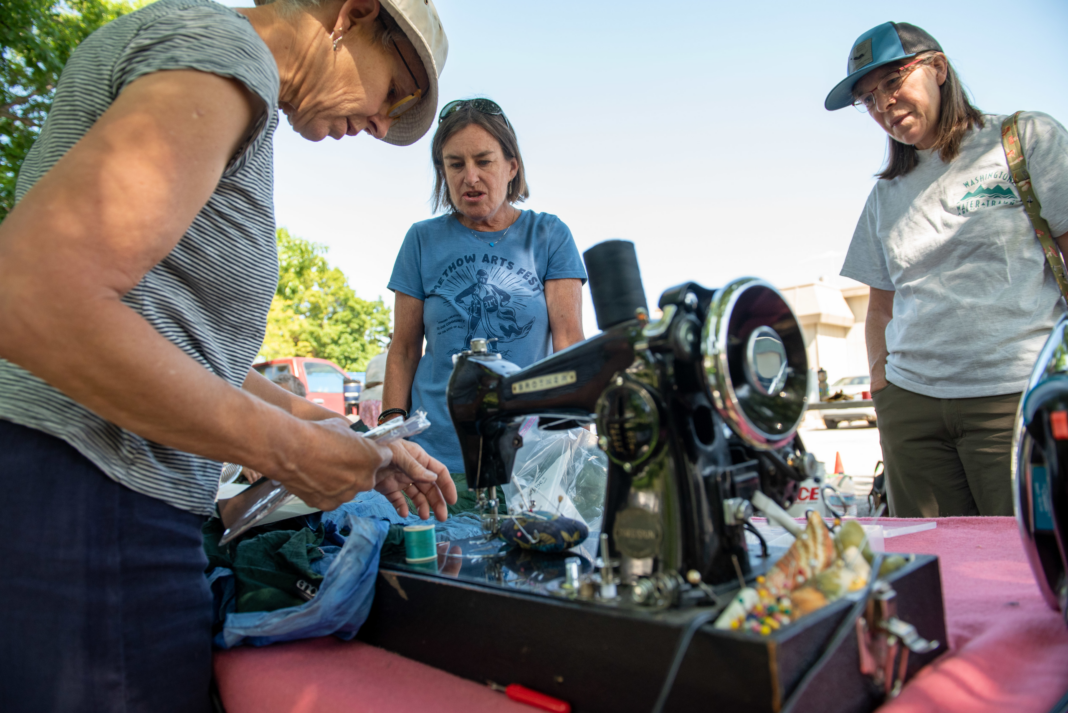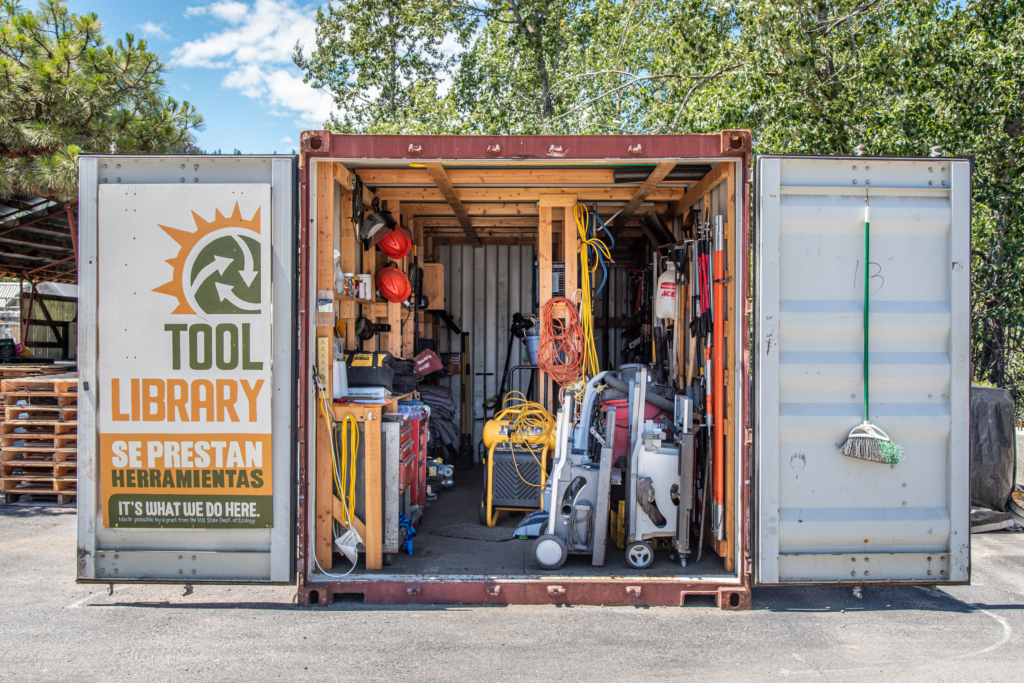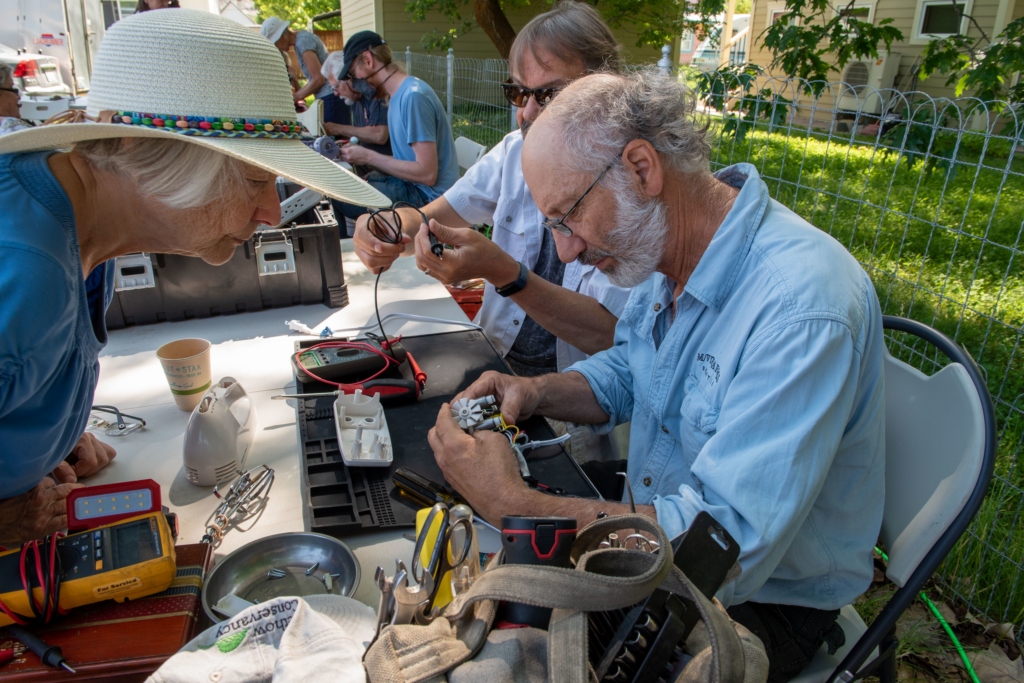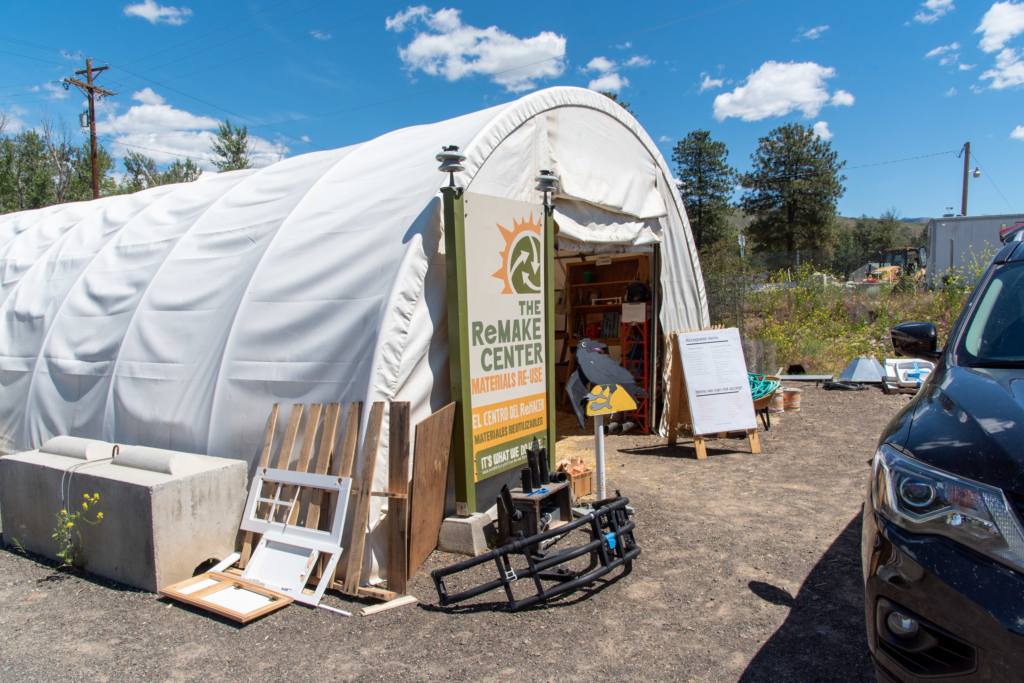It’s expensive to ship items in and out of Washington State’s Methow Valley. Building a circular economy is reducing costs and creating community.
In Washington State’s rural Methow Valley, residents can borrow tools, pick up surplus building supplies, drop off kitchen waste for composting, or have broken items repaired — all for free, or nearly free. These things are part of the local recycling center’s efforts to create a circular economy — one that, as the U.S. Environmental Protection Agency puts it, “keeps materials, products, and services in circulation for as long as possible.”
The recycling center, Methow Recycles, has teamed up with five other local organizations to explore ways in which the whole community can become less reliant on new and imported resources while the area’s economy continues to thrive and grow.
The team is led by TwispWorks, a nonprofit economic development organization, and includes representatives from business, waste-management organizations, and academia. The Washington State Department of Commerce is providing both financial support and technical guidance to help the partners explore ideas and develop practical solutions.
Tucked against the east slope of the Cascade range, the Methow Valley is 200 miles from Seattle and more than an hour’s drive from the nearest commercial airport. Access is via two-lane highways, the most popular of which is closed for several months in the winter. The valley is home to about 6,000 people — including multi-generation ranching families, young farmers, and remote workers — who cherish the place for its beauty, quality of life, and strong sense of community.
Bringing anything into the valley requires a lot of energy — and so does removing waste products. That’s one reason the project team is looking for ways to make better use of products and materials once they’ve reached the valley and is seeking ways to reuse materials that are commonly seen as waste. Making better use of what does come into the community will reduce the Methow Valley’s carbon footprint and help minimize their production of greenhouse gasses that contribute to climate change by decreasing the amount of fuel — and resultant fumes — needed to get things to the valley.
Circular economies look to the waste stream as a source of materials, said Patrick Law, TwispWorks Economic Program Director, seeking opportunities to generate value from things that are usually discarded. Law credits Methow Recycles with getting the process started by moving beyond the classic “Reduce, Reuse, Recycle” mantra with programs that make it easy for locals to live more lightly. The center’s Share Library is one example — it includes dozens of items, from basics like saw horses and loppers to more specialized tools like a tile saw and an angle grinder. Most are free to borrow; some, like a cordless drill with bits that may break or wear out, cost $3 or $5 to use for a week. Access to the library means people don’t have to buy their own tools, so individuals have less stuff to pay for, store, and maintain, and the community as a whole imports fewer goods and.
A few yards from the Share Library, Methow Recycles’ Re-Make Tent displays a constantly changing inventory of building materials, from joist hangers to door knobs, bathroom tile to plywood, concrete blocks to decorative mirrors — anything that contractors and other members of the community don’t need may find its way to the tent to be picked up for a small fee by someone who can use it.
Methow Recycles also partners with the local food bank to host repair cafés that help keep the things people own in circulation longer. On a recent Saturday, a couple dozen people mingled and chatted while volunteer fixers worked to make worn and broken items useful again. I watched a marine mechanic replace the switch on a hand-held sander, while a plumber tinkered with an antique music box. Across the room, one retired physician mended a moth-eaten pullover while another sharpened a pocket knife. A couple carrying an armload of pruning equipment waited at the sharpening table while a woman towing a newly re-wired floor lamp on a dolly maneuvered toward the door.
Local businesses have also found productive ways to use waste. Methow Recycles Executive Director Sarah Jo Lightner cites the local brewery, which has found outlets for the grain used in beer making: “[Some of] their spent grain goes to the compost facility … some of their spent grain goes to feed cows and pigs.” The compost facility is a recent start-up that uses kitchen waste produced by residents and restaurants, keeping those materials out of landfills, where they would take up space and generate pollution. Any household that contributes kitchen waste to the facility will receive a free bag of the resulting compost; the rest will be sold to local farmers, gardeners, and landscapers, or sent to a local vermicomposter to be turned into worm castings — black gold for the soil. That’s the kind of circularity that Lightner and Law would like to see more of. With the rest of their team, they plan to explore other ways in which businesses can make use of local waste products — and also create jobs, keeping the community’s economy healthy as well as lean.
Joshua Porter, Director of the Sustainability Pathways program at Western Washington University, points out that bringing goods and materials to the Methow Valley — as well as disposing of them — contributes significantly to greenhouse gas emissions. Anything that’s discarded is trucked out of the valley, said Porter, and once in landfills, decomposing materials generate pollutants in the form of methane and carbon dioxide. Importing fewer goods and materials and making better use of them once they arrive would reduce the carbon load at both ends of the waste stream.
Circular economies look to the waste stream as a source of materials, said Patrick Law, TwispWorks Economic Program Director, seeking opportunities to generate value from things that are usually discarded.
And, it would save business owners money — money they could invest in growth and use to hire more employees, said Law. “We're also looking at how jobs can be created through the development and creation of new businesses” that could fill identified needs in the community, he said.
Porter and Lightner also believe that retooling the economy for sustainability will end up creating a more livable and vibrant community.
Lightner points to how interactions at Methow Recycles’ repair cafés build community. The repair café “has no socioeconomic barriers, because it's a free event … we have people of all socioeconomic backgrounds using the program, which may be the first time that they're all in the same space together.” Establishing connections at the repair café “helps us build community resilience,” said Lightner. “So in times of pandemic or wildfires, we already have established relationships with each other, and that's one of the great things that circular programs can bring to communities.” In those times of crisis, when anything from water and power supplies to school schedules and grocery shopping may be disrupted, neighborly connections can be the one stable element that makes sure everyone’s needs are met as the community unites to face a challenge.
Porter cited the value of wider community connections, too, highlighting those his students have made with senior citizens who have “lived experience” of less consumption-driven ways of life. Connections like those, he said, are “acts of hope,” and one means by which we can begin “actively creating the world we wish to live in through our choices and actions.”






